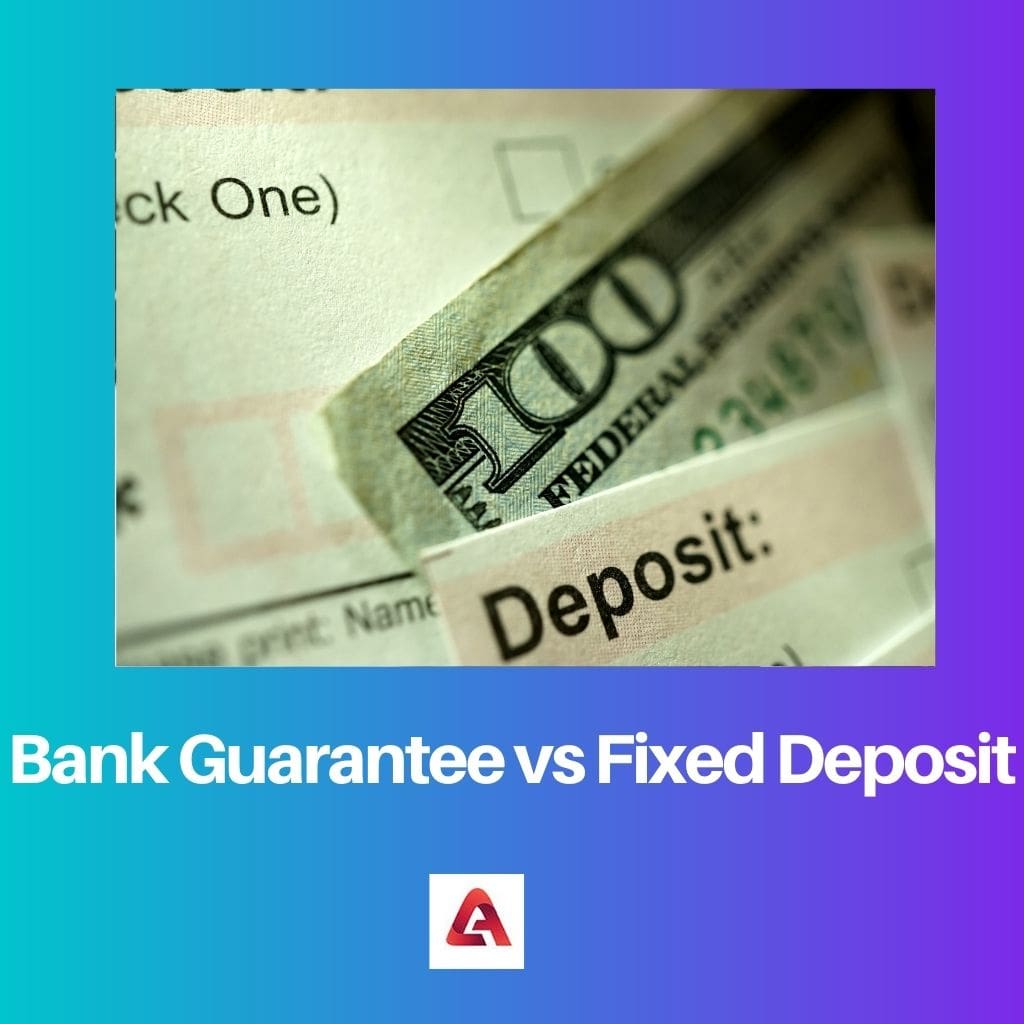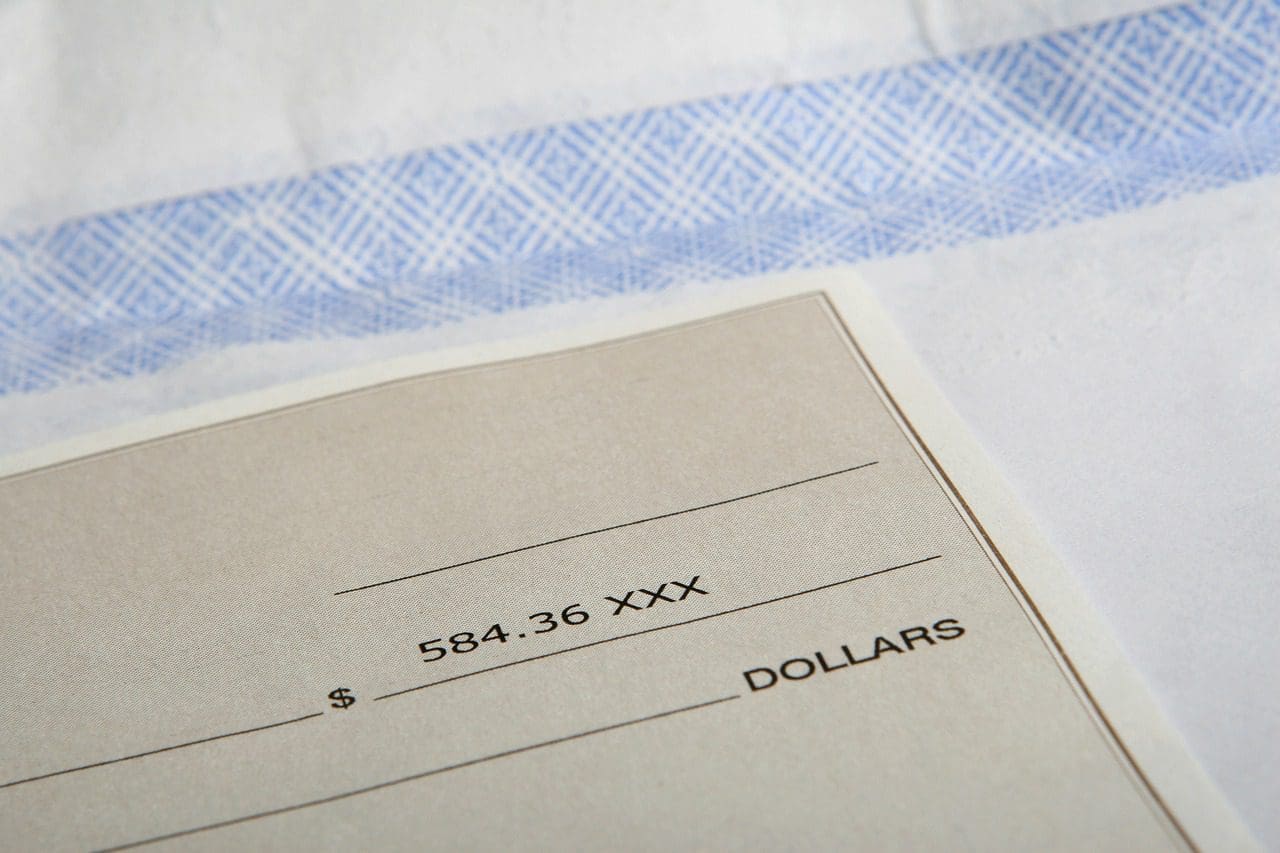A bank guarantee is a financial commitment by a bank to cover a specified amount of debt or contractual obligation on behalf of a customer if they fail to fulfill it. In contrast, a fixed deposit is an investment where funds are deposited for a predetermined period at a fixed interest rate, offering stable returns but without the risk mitigation aspect of a guarantee.
Key Takeaways
- A Bank guarantee is a form of financial security issued by a bank to guarantee the payment or performance of a contract. At the same time, a fixed deposit is a savings account that earns a fixed interest rate over a set period.
- A Bank guarantee is used in business transactions to assure parties that a contract will be fulfilled, while fixed deposits are a common investment option for individuals.
- Bank guarantees and fixed deposits involve working with a bank to manage finances, but they serve different purposes and benefits.
Bank Guarantee vs Fixed Deposit
A bank guarantee is an oath by a bank to pay a fix amount of money to a beneficiary if the party that requested the guarantee fails to fulfill their contractual obligations. A Fixed Deposit (FD) is a financial tool provided by banks, where customers deposit a lump sum of money for a fixed period.

Comparison Table
| Feature | Bank Guarantee | Fixed Deposit |
|---|---|---|
| Purpose | Provides financial security in a transaction | Saves money and earns interest |
| Function | Bank acts as a guarantor if one party fails to fulfill their obligations | Bank holds your deposited funds for a fixed term and pays interest |
| Who uses it? | Businesses and individuals in specific situations (e.g., international trade, renting property) | Individuals looking to save money and earn returns |
| Guaranteed return? | No | Yes, a fixed interest rate is guaranteed upon deposit |
| Access to funds | Limited access, only if the guarantee is called upon | Limited access, penalized for early withdrawal |
| Cost | Fee charged by the bank for issuing the guarantee (1-2%) | No fee, but potential loss of interest if withdrawn early |
| Risk | Bank may refuse to pay the guarantee if certain conditions are not met | Risk of losing potential returns in other investment options |
What is Bank Guarantee?
Introduction to Bank Guarantee:
A bank guarantee is a financial instrument provided by a bank on behalf of a customer to ensure that the customer fulfills a contractual obligation or meets a financial commitment to a third party. It serves as a form of security for the recipient of the guarantee, assuring them that they will receive payment or compensation if the customer fails to fulfill their obligations.
Types of Bank Guarantees:
Bank guarantees come in various types, each designed to serve different purposes:
- Bid Bond Guarantee: This type of guarantee is commonly used in the bidding process for contracts. It assures the project owner that the bidder has the financial capability to undertake the project if awarded.
- Performance Guarantee: Performance guarantees are issued to ensure that a party fulfills their contractual obligations satisfactorily. It protects the project owner from financial loss if the contractor fails to complete the project as agreed.
- Advance Payment Guarantee: In situations where advance payments are made by the buyer to the seller, an advance payment guarantee ensures that the seller will either fulfill their obligations under the contract or repay the advance payment if they fail to do so.
- Financial Guarantee: Financial guarantees are provided by banks to support financial transactions such as loans or leases. They assure the lender or lessor that the borrower or lessee will fulfill their financial obligations.
Process of Obtaining a Bank Guarantee:
- Application: The customer requesting the bank guarantee submits an application to the issuing bank. This application includes details of the transaction or contract requiring the guarantee, as well as any supporting documentation.
- Evaluation and Approval: The bank evaluates the creditworthiness and financial standing of the customer before deciding whether to issue the guarantee. If approved, the terms and conditions of the guarantee are negotiated, including the amount, validity period, and fees.
- Issuance: Once the terms are agreed upon and any required collateral is provided, the bank issues the guarantee to the beneficiary (the party receiving the guarantee). The beneficiary can rely on the bank’s commitment to fulfill the guarantee if the customer defaults on their obligations.

What is Fixed Deposit?
Introduction to Fixed Deposit:
A fixed deposit (FD), also known as a term deposit or time deposit, is a financial instrument offered by banks and financial institutions where an individual or entity deposits a sum of money for a predetermined period at a fixed interest rate. Fixed deposits are popular investment options due to their safety, stability, and guaranteed returns.
Features of Fixed Deposits:
- Fixed Interest Rate: One of the defining features of fixed deposits is the fixed interest rate offered by the bank or financial institution. This interest rate remains constant throughout the tenure of the deposit, providing certainty to investors about their returns.
- Tenure: Fixed deposits have a predetermined tenure, which can vary from a few months to several years. Investors can choose the tenure based on their financial goals and liquidity requirements. Longer tenures offer higher interest rates.
- Safety and Security: Fixed deposits are considered safe and secure investment options, primarily because they are backed by the deposit insurance scheme provided by governments in many countries. This scheme ensures that depositors receive compensation in case the bank or financial institution fails.
- Liquidity: While fixed deposits offer guaranteed returns, they are not as liquid as savings accounts or some other investment options. Withdrawals before the maturity date may incur penalties or result in lower interest rates. However, many banks offer premature withdrawal facilities with certain conditions.
Benefits of Fixed Deposits:
- Stable Returns: Fixed deposits provide stable and predictable returns, making them ideal for investors seeking steady income streams or looking to preserve capital.
- Risk Mitigation: As fixed deposits are considered low-risk investments, they are suitable for conservative investors who prioritize capital preservation over higher returns.
- Diversification: Fixed deposits offer diversification benefits to investment portfolios by providing a stable asset class that can offset the volatility of riskier investments such as stocks or mutual funds.
Process of Opening a Fixed Deposit:
- Selection of Bank or Financial Institution (H4): Investors choose a bank or financial institution based on factors such as reputation, interest rates offered, and deposit insurance coverage.
- Choosing the Deposit Amount and Tenure (H4): Investors decide on the amount to be deposited and the tenure of the fixed deposit based on their financial goals, liquidity needs, and interest rate expectations.
- Opening the Fixed Deposit Account (H4): Investors fill out the necessary application forms and provide the required documents, such as identity proof, address proof, and PAN card. Once the account is opened and the funds are deposited, the fixed deposit is initiated.

Main Differences Between Bank Guarantee and Fixed Deposit
- Nature of Financial Instrument:
- Bank Guarantee:
- Acts as a form of security provided by a bank on behalf of a customer to ensure fulfillment of contractual obligations or financial commitments.
- Fixed Deposit:
- Represents an investment made by an individual or entity by depositing funds with a bank or financial institution for a fixed period at a predetermined interest rate.
- Bank Guarantee:
- Purpose and Usage:
- Bank Guarantee:
- Primarily used to provide assurance to a beneficiary that a contractual obligation will be fulfilled or to secure financial transactions.
- Fixed Deposit:
- Used as an investment vehicle to earn interest income and preserve capital over a predetermined period.
- Bank Guarantee:
- Risk and Return Profile:
- Bank Guarantee:
- Offers risk mitigation for the beneficiary as the bank assumes the responsibility of payment if the customer defaults, but does not generate direct returns for the customer.
- Fixed Deposit:
- Involves a relatively lower risk since the principal amount is guaranteed by the bank, and provides fixed returns in the form of interest over the investment period.
- Bank Guarantee:
- Liquidity:
- Bank Guarantee:
- Usually involves tying up funds for the duration of the guarantee, limiting liquidity during that period.
- Fixed Deposit:
- Provides varying degrees of liquidity depending on the terms, with penalties for early withdrawal in some cases but allowing access to funds when needed.
- Bank Guarantee:
- Tax Implications:
- Bank Guarantee:
- Typically not subject to taxation directly, but any fees or interest earned on the underlying transaction may be taxable.
- Fixed Deposit:
- Interest earned on fixed deposits is subject to taxation, impacting overall returns for the investor.
- Bank Guarantee:
- Flexibility and Negotiability:
- Bank Guarantee:
- Terms and conditions of bank guarantees are negotiable between the customer and the issuing bank, tailored to specific transactions or contracts.
- Fixed Deposit:
- Terms of fixed deposits are predetermined by the bank, offering limited flexibility for negotiation but providing a standardized investment option.
- Bank Guarantee:
- Purpose in Financial Planning:
- Bank Guarantee:
- Often used in commercial transactions, project bidding, and trade finance to provide assurance and facilitate deals.
- Fixed Deposit:
- Utilized by individuals and organizations for savings, wealth preservation, and income generation, forming part of a diversified investment portfolio.
- Bank Guarantee:

Last Updated : 04 March, 2024

Chara Yadav holds MBA in Finance. Her goal is to simplify finance-related topics. She has worked in finance for about 25 years. She has held multiple finance and banking classes for business schools and communities. Read more at her bio page.

Bank Guarantee and Fixed Deposit seem to be great options for managing finances and securing payments. The detailed comparison makes it clear how to choose between the two.
I find this article very helpful in understanding the concepts of Bank Guarantee and Fixed Deposit. It encourages informed decision-making.
The comprehensive details provided in the article help in understanding the key takeaways of Bank Guarantee and Fixed Deposit.
The detailed comparison table and explanations of Bank Guarantee and Fixed Deposit are insightful and relevant for financial planning and investment decisions.
The explanation of how Bank Guarantees work and the details of Fixed Deposits are presented with clarity and precision. It’s beneficial for anyone seeking comprehensive knowledge on these financial tools.
The article provides insightful information on Bank Guarantee and Fixed Deposit. It helps to understand the concept and benefits of each financial tool clearly.
It’s clear that Bank Guarantee and Fixed Deposit serve different purposes. This is helpful for individuals and businesses seeking financial security.
I appreciate how the article elaborates on the advantages of Bank Guarantee and Fixed Deposit, making it easier to understand the benefits of each option.
The comparison between Bank Guarantee and Fixed Deposit is very informative and useful for making financial decisions.
Absolutely! It’s essential to know the differences and suitability of each option when managing finances.
The risk factors and suitability of Bank Guarantee and Fixed Deposit are well explained. This detail-oriented approach helps in evaluating the best choice based on individual needs.